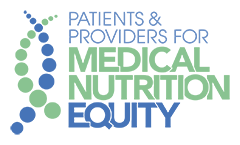I am a pediatric gastroenterologist and treat children with a variety of digestive conditions that require medical nutrition. I often see patients whose digestive conditions mandate that they be on special diets or supplements and yet these diets cannot be afforded. A.B. is a 9-year-old boy who was born with a condition called ‘jejunal atresia.’ While developing in utero, he lost blood flow to a part of his intestines, resulting in him being born with only about 10% of the length of intestine required to absorb fluid and nutrients. Without intravenous (IV) fluid and IV nutrition, he would not have been able to survive. And so for the first 7 years of his life, A.B. was dependent upon that IV fluid and nutrition, given at home through a surgically placed IV line. And that life saving IV nutrition was of course covered by his insurance.
With the help of a large medical care team, his intestines were slowly growing stronger and longer over that time span. He was able to tolerate more and more nutrition given orally, meaning that he required less and less support through his special IV. And by age 7, the time came when we were able to remove his IV line. For the first time in his life, AB was able to go to bed at night without being hooked up to complex tubing. And he was finally able to go swimming, which had not been possible with his special IV in place. He and his family were thrilled! But AB’s intestines were of course still not “normal.” Even with their miraculous growth, they are still only able to absorb about 30% of what he eats and drinks. Which means that he still requires a huge amount of nutritional support. In addition to eating 3 large meals and 2 snacks per day, he has to drink 3 bottles of high-calorie formula daily; “shakes,” as he calls them. Without these “shakes”, he would be unable get the calories that he needs to grow. He has to drink 4 Liters (!!) of Pedialyte per day in order to avoid dehydration. And he as to take 4 different vitamin supplements throughout the day in order to build strong bones and prevent deficiencies in important vitamins and minerals.
For many children and adults, supplements like his special formula, Pedialyte, and vitamins, are a personal choice and not necessarily required. But for AB, they are medically necessary – life saving, in fact. And yet despite these “supplements” being medically necessary, they are not covered by the vast majority of insurance programs. This means that hard working family’s like his are forced to pay several hundred dollars per month to keep their children healthy. Or worse, it means that in situations where that is not financially feasible for a family, then the children go without these medical foods and therefore suffer negative consequences to their health and growth.
Stories like this are not uncommon in my field of pediatric gastroenterology and nutrition. And I would love nothing more than universal insurance coverage of medical foods for specific, approved diagnoses.
